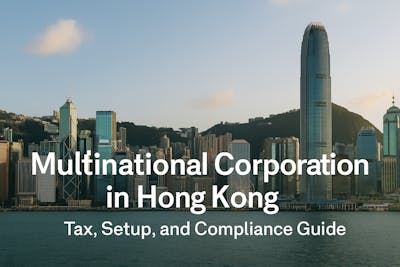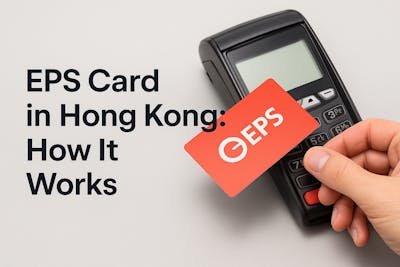Set up contracts, visas, tech, and tools to build a compliant and efficient remote team in Hong Kong.
Even remote hires must meet Hong Kong rules on wages, MPF, insurance, and contracts.
Use the right tools and clear policies to manage performance, security, and engagement.
Account for MPF, insurance, benefits, recruitment, and training—not just salaries.
Hong Kong’s prime location in Asia makes it a popular choice for companies looking to grow internationally. This detailed guide explains everything employers need to know—from local labor laws to successfully onboarding new hires.
Focused Steps to Set Up a Remote Workforce in Hong Kong
Here's a breakdown of the steps to set up a remote workforce in Hong Kong:
1. Employment and Visa
- Local vs. Foreign Talent: Decide if you'll hire locally in Hong Kong or remotely from other countries.
- Visa Requirements: For foreign hires, understand Hong Kong's visa options. There are no specific remote work visas, but options exist, such as the Quality Migrant Admission Scheme (QMAS) or General Employment Policy (GEP). Verify these details for eligibility requirements.
- Employment Contracts: Draft clear employment contracts that address remote work arrangements, including work hours, communication expectations, and data security.
2. Business Setup (Optional):
Consider establishing a legal entity in Hong Kong if you plan on long-term remote operations or require a local banking account. This involves registering your business with the Companies Registry.
3. Technology and Infrastructure
- Communication Tools: Invest in reliable tools for seamless communication and collaboration. This might include video conferencing (e.g., Zoom, Google Meet), project management software (e.g., Asana, Trello), and instant messaging (e.g., Slack, Microsoft Teams).
- Equipment and Software: Provide your remote team with the necessary hardware and software to perform their jobs effectively. This could include laptops, monitors, and industry-specific software subscriptions.
- Cybersecurity: Implement robust cybersecurity measures to protect your company data and communication channels. This includes training your team on data security best practices and employing encryption tools.
4. Remote Work Management
- Standardized Workflows: Establish clear and standardized workflows for tasks, approvals, and project management.
- Performance Management: Set clear performance expectations and conduct regular check-ins with your remote team members to track progress, offer support, and address concerns.
- Communication Strategy: Develop a communication strategy that prioritizes clear, consistent, and open communication across the team. This might involve setting communication guidelines, preferred methods (email, video calls, etc.), and scheduling regular team meetings.
- Team Building and Engagement: While working remotely, fostering team spirit can be a challenge. Schedule virtual social events, team-building activities, and encourage informal interaction during online meetings.
5. Legal and Compliance
- Labor Laws: Ensure you comply with Hong Kong's labor laws regarding working hours, minimum wage, and employee benefits, even for a remote workforce.
- Taxation: Understand Hong Kong's tax regulations for remote employees. You might need to consult a tax advisor for specific guidance.
By following these steps, you can establish a well-structured and compliant remote workforce in Hong Kong. Remember, adapting these steps to your specific business needs and company culture is crucial for success.

How Hiring Works in Hong Kong
Hong Kong is a fast-paced global city with a strong economy and a mix of Eastern and Western cultures. It offers many career paths for professionals, but its hiring process has some unique aspects. Understanding how things work is important for both employers and job seekers.
Exploring Hong Kong’s Job Scene
The job market in Hong Kong is broad, with positions in finance, technology, hospitality, and trade. Finance is the leading industry, followed by logistics and trading. Before hiring or applying, it’s helpful to learn about job trends, in-demand skills, and average salaries.
Where to Look for Jobs
Popular websites like JobsDB, Monster, and LinkedIn are widely used for job searches in Hong Kong. Many people also find jobs through personal connections and networking events, which play a big role in the hiring process.
Sending Your Application
To apply for a job in Hong Kong, candidates usually submit a resume and cover letter. These documents should match local standards. Employers may ask for a curriculum vitae (CV), which focuses more on educational background and work experience than a typical resume.
What to Expect in Interviews
Job interviews in Hong Kong often include several rounds, covering technical skills and cultural fit.
Work Visa Basics
Foreign workers need a valid visa to work in Hong Kong. The most common is the Employment Visa, which must be arranged by the hiring company. The application requires proof of qualifications, a confirmed job offer, and other paperwork. Starting early helps avoid delays.
Talking About Salary and Benefits
In Hong Kong, salaries are often adjusted to match the high cost of living. Many employees receive bonuses and housing allowances. It’s important for job seekers to know the standard pay range for their role and industry when discussing compensation.
Workplace Culture Tips
Business culture in Hong Kong values respect, professionalism, and clear hierarchy. Understanding these customs helps both employers and employees build strong working relationships and succeed in the local work environment.
Knowing the Legal Rules
Clear labor laws govern employment in Hong Kong. Both sides must follow these rules. Employers and workers should read employment contracts carefully and understand their rights, benefits, and legal responsibilities before starting a job.
Understanding the Cost of Hiring an Employee in Hong Kong
Hiring employees in Hong Kong comes with several important costs—some required by law and others optional but often necessary for attracting top talent. Companies planning to build a team in this global financial hub need to understand both types of expenses to budget wisely and stay compliant with local regulations.
Base Salary
The most obvious cost of hiring is the employee’s salary. In Hong Kong, wages can vary widely depending on the job role, industry, and experience level. To attract skilled professionals, employers must offer competitive pay that aligns with current market trends.
Mandatory Provident Fund (MPF)
Hong Kong requires both employers and employees to contribute to the Mandatory Provident Fund (MPF), which helps employees save for retirement. Each party must contribute 5% of the employee’s relevant income, up to a monthly cap. Knowing how to handle MPF contributions is a key part of staying legally compliant.
Employee’s Compensation Insurance
By law, employers must provide Employee’s Compensation Insurance. This covers costs in case an employee is hurt or gets sick because of their job. The insurance cost depends on how risky the job is and the industry involved.
Tax Responsibilities
Although employees are responsible for paying their own salaries tax, employers still need to understand how benefits like housing or travel allowances may affect tax reporting. Hong Kong’s tax system only taxes income earned within the city, but benefits-in-kind can still have tax implications.
Extra Benefits and Perks
To stand out in the job market, many companies offer optional perks, such as medical insurance, transportation allowances, housing support, or annual bonuses. While not required by law, these extras can greatly improve employee satisfaction and help with long-term retention.
Hiring and Recruitment Costs
The recruitment process itself can be expensive. Advertising job openings, screening candidates, and holding interviews all add up. Employers can reduce these costs by making their hiring process more efficient and targeting the right candidates from the start.
Training and Development
While not an upfront requirement, investing in training is important for long-term success. Teaching new hires the skills they need to grow within the company helps create a stronger, more capable team over time.
Final Thoughts
By following the detailed steps in this guide, employers can navigate the hiring landscape, mitigate risk, and build a high-performing remote team grounded in legal compliance and operational excellence.
Whether hiring locally or managing international talent, success in Hong Kong begins with understanding the rules and investing in people the right way.
Need help with registering your company? Air Corporate can help!
FAQs
You can become a remote worker in Hong Kong only if you have a necessary work permit.
Difficulty in securing a work visa varies on a case-to-case basis.
No one can guarantee a positive outcome of your visa application.
Businesses engaged in computer & IT, marketing, project management, medical and health, recruiting, and accounting are more likely to offer remote positions.






